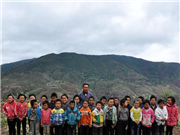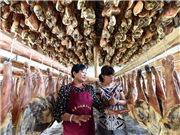

Social security and employment
We will keep to the rate of 10% in raising basic pension benefits for enterprise retirees. In reforming and improving the basic pension system for workers, we will focus on actuarial balance, combining contributions from different sources with funds in personal accounts, so as to close loopholes in the system and strengthen the supporting capacity of the insurance fund.
A basic pension system for the employees of Party and government offices and public institutions will be established, in which the contribution from the employer is equivalent to 20% of the employee’s total salary and the individual contribution is equivalent to 8% of the base figure of the employee’s salary. An occupational annuity system will also be established, in which the contribution from the employer is equivalent to 8% of an employee’s total salary and the individual contribution is equivalent to 4% of the base figure of the employee’s salary. Adjustments will be made to the salaries of employees in government bodies and public institutions. For public servants at the county level or lower, a salary system based on both position and rank will be implemented. We will complete work on standardizing allowances and subsidies for public servants and introducing performance-based pay in public institutions, and conduct research on the establishment of a system of additional allowances for certain areas.
We will increase support for financial aid and living subsidies to people facing serious difficulties to ensure that they have access to basic necessities, implement the temporary assistance system nationwide, and make sure work related to the subsistence allowances for both urban and rural residents is done properly. Adjustments will be made to subsidies and living allowances for entitled groups when appropriate.
We will optimize the mix of expenditures on employment. We will implement the initiative for promoting employment for university graduates and the scheme for guiding university students in starting new businesses, and give priority to work related to the employment of groups in more difficult circumstances, including migrant workers. We will put into effect and improve the policy of providing subsidies from the unemployment insurance fund to enterprises which maintain stable employee numbers during structural adjustments, and reduce the contributions of enterprises to the unemployment insurance fund. We will strengthen the government’s capacity for providing public employment services.
Medical and health care
We will increase investment in public health services and comprehensive public hospital reform. We will raise annual per capita spending on basic public health services from 35 yuan to 40 yuan, with the entire additional funds in rural areas to be used for purchasing basic public health services from rural doctors. We will increase support for the prevention and control of major diseases. The comprehensive reform of county-level public hospitals will be extended to all counties, and the central government will continue to provide a subsidy of three million yuan per county. The reform of public hospitals in urban areas will be extended to more cities. Efforts will be continued to provide standardized training for resident physicians, with annual subsidies of 30,000 yuan per person from the central government.
We will improve the basic medical insurance system for urban and rural residents, raise government subsidies for the new rural cooperative medical care system and basic medical insurance for nonworking urban residents from 320 yuan to 380 yuan per person per annum, and make a corresponding increase to the annual individual contribution, which will go up from 90 to 120 yuan per person. The major disease insurance scheme for rural and non-working urban residents will be introduced nationwide, with an appropriate increase in the required contributions.
Agriculture
We will increase support for implementing the strategy on developing sustainable, ecologically friendly agriculture. The trials for restoring and improving cultivated land contaminated by heavy metals and trials for dealing comprehensively with the over-abstraction of groundwater will both be expanded. We will support efforts to improve the subsoil of cropland, develop eco-friendly tilling, and return plant stalks to fields in order to restore and improve the productivity of the land. We will give greater support to major grain-, edible oil-, and seed-producing counties, and improve the mechanisms for subsidizing major grain-growing areas. We will strengthen the building of farmland irrigation and water conservancy infrastructure and supporting end-use facilities for major water conservancy projects. We will increase investment in comprehensive agricultural development, and work hard to build high-grade farmland.
We will improve the policies on agricultural subsidies, intensify efforts to combine funds for this purpose, and use subsidies in a more precise, targeted, and effective way. We will improve the methods for carrying out reforms to ensure guaranteed base prices for cotton and soybeans. Great effort will be channeled into offering support to larger-scale operations, making thoroughgoing innovations in farmer cooperatives, intensifying institutional innovation in the trials to provide commercial services for the whole process of agricultural production, and integrating the development of primary, secondary, and tertiary industries in rural areas. Policies on rural finance and agricultural insurance will be improved to guide more private capital to invest in the development of modern agriculture.
We will improve the government award and subsidy mechanism for village-level public works launched on the basis of deliberation by villagers, and continue developing pilot projects for building beautiful rural areas and trials to exemplify towns designated by provincial-level governments. We will work proactively to advance demonstrations and trials for comprehensive rural reform and the pilot reform to relieve state-owned farms of social service responsibilities, and we will search for effective ways to develop the rural collective economy. We will support steady steps forward in the trials for determining, registering, and certifying contracted rural land-use rights, with subsidies of 150 yuan per hectare from the central government for China’s cultivated land area of 121 million hectares. These subsidies will be granted on a yearly basis according to the actual progress of the work. We will support poverty alleviation and development in major contiguous poor areas, and carry out carefully targeted measures to ensure that the funding for poverty alleviation actually reaches the people who need it.
 |  |
Day|Week

 Tsinghua junior makes over 10,000 yuan a day by selling alumnae's used quilts
Tsinghua junior makes over 10,000 yuan a day by selling alumnae's used quilts Graduation photos of students from Zhongnan University
Graduation photos of students from Zhongnan University A school with only one teacher in deep mountains
A school with only one teacher in deep mountains Glimpse of cultural heritage "Xilankapu"
Glimpse of cultural heritage "Xilankapu" Homemade cured hams in SW China
Homemade cured hams in SW China Breathtaking buildings of W. Sichuan Plateau
Breathtaking buildings of W. Sichuan Plateau Graduation photos of "legal beauties"
Graduation photos of "legal beauties" Top 10 most expensive restaurants in Beijing in 2015
Top 10 most expensive restaurants in Beijing in 2015